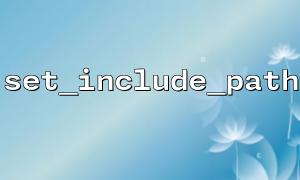In PHP development, loading third-party libraries is a common task. To ensure external libraries are correctly included and used, it is often necessary to set PHP’s include path. set_include_path() is one of the tools used to set or modify this path. This article will guide you on how to properly use set_include_path() and share practical tips to help you load third-party libraries more efficiently.
First, let’s understand the basic usage of set_include_path(). This function is used to set PHP’s include path, specifying one or more directories where PHP will search for files referenced by include or require statements.
Syntax:
<span><span><span class="hljs-title function_ invoke__">set_include_path</span></span><span>(</span><span><span class="hljs-keyword">string</span></span><span> </span><span><span class="hljs-variable">$path</span></span><span>);
</span></span>The $path parameter specifies the include path. It can be a single directory or multiple paths separated by PATH_SEPARATOR (semicolon “;” on Windows, colon “:” on Unix/Linux).
You can use set_include_path() to flexibly set multiple directory paths, allowing PHP to search for files within these directories. For example:
<span><span><span class="hljs-comment">// Set include path</span></span><span>
</span><span><span class="hljs-title function_ invoke__">set_include_path</span></span><span>(</span><span><span class="hljs-string">'/path/to/your/library'</span></span><span> . PATH_SEPARATOR . </span><span><span class="hljs-title function_ invoke__">get_include_path</span></span><span>());
</span></span>In this example, set_include_path() adds the /path/to/your/library directory to the existing include_path. Using get_include_path() allows you to view the current include path and ensures that new directories are added without removing existing ones.
During development, you may need to load library files using relative paths. You can combine set_include_path() with dirname() to set relative paths.
<span><span><span class="hljs-comment">// Set relative path</span></span><span>
</span><span><span class="hljs-title function_ invoke__">set_include_path</span></span><span>(</span><span><span class="hljs-title function_ invoke__">dirname</span></span><span>(</span><span><span class="hljs-keyword">__FILE__</span></span><span>) . </span><span><span class="hljs-string">'/libs'</span></span><span> . PATH_SEPARATOR . </span><span><span class="hljs-title function_ invoke__">get_include_path</span></span><span>());
</span></span>Here, dirname(__FILE__) returns the current script’s directory, and /libs is the folder containing third-party libraries. This ensures that the libraries can be correctly loaded regardless of where the script is executed.
Once the include path is set, PHP will search for files according to the specified directory order. Suppose we have a third-party library file named MyLibrary.php located in /path/to/your/library, it can be included as follows:
<span><span><span class="hljs-comment">// Include third-party library</span></span><span>
</span><span><span class="hljs-keyword">include_once</span></span><span>(</span><span><span class="hljs-string">'MyLibrary.php'</span></span><span>);
<p></span>// Use a class from the library<br>
$library = new MyLibrary();<br>
$library->doSomething();<br>
</span>Since the include path has been set with set_include_path(), PHP will automatically search for MyLibrary.php in the specified directories without needing the full path.
When debugging include paths, use get_include_path() to check the current path settings. This is very helpful to ensure the paths are correct.
<span><span><span class="hljs-comment">// Output the current include path</span></span><span>
</span><span><span class="hljs-keyword">echo</span></span><span> </span><span><span class="hljs-title function_ invoke__">get_include_path</span></span><span>();
</span></span>By outputting the current path, you can clearly see the directories PHP is searching. If there are issues, you can identify them by inspecting the path settings.
Directory order matters: Paths set by set_include_path() are searched in order. Incorrect ordering may prevent some library files from being loaded correctly.
Avoid overriding the default path: Don’t replace PHP’s default include_path lightly, as it may affect loading of other system files. Use get_include_path() to get the current path and append new directories instead of fully replacing it.
Use absolute paths: Whenever possible, use absolute paths to avoid errors caused by relative paths. Although relative paths can be convenient in some cases, absolute paths reduce potential path issues.
Use ini_set() to temporarily modify include_path: If you want to change the include path only for the current script, you can dynamically set it using ini_set():
<span><span><span class="hljs-title function_ invoke__">ini_set</span></span><span>(</span><span><span class="hljs-string">'include_path'</span></span><span>, </span><span><span class="hljs-string">'/path/to/your/library'</span></span><span>);
</span></span>This path setting only applies to the current script and does not affect other scripts after execution.
While set_include_path() is a valid way to load third-party libraries, more PHP developers today prefer using Composer to manage libraries and dependencies. Composer provides an autoloader, making manual include path configuration unnecessary. Simply install the library via Composer, and it will automatically set up paths and generate the appropriate autoload file.
<span><span>composer require vendor/package-name
</span></span>Then in your PHP file, just include Composer’s autoload file:
<span><span><span class="hljs-keyword">require_once</span></span><span> </span><span><span class="hljs-string">'vendor/autoload.php'</span></span><span>;
</span></span>Composer will automatically load all required dependencies, avoiding the hassle of manual path configuration.
Using set_include_path() to load third-party libraries can still be a very useful technique in certain scenarios. By properly setting the path, PHP can correctly load library files, reducing debugging issues caused by incorrect paths. However, with the widespread adoption of modern PHP development tools, using Composer to autoload libraries has become a more efficient and recommended approach. If you haven’t tried Composer yet, it’s highly recommended, as it saves a lot of manual configuration effort.





